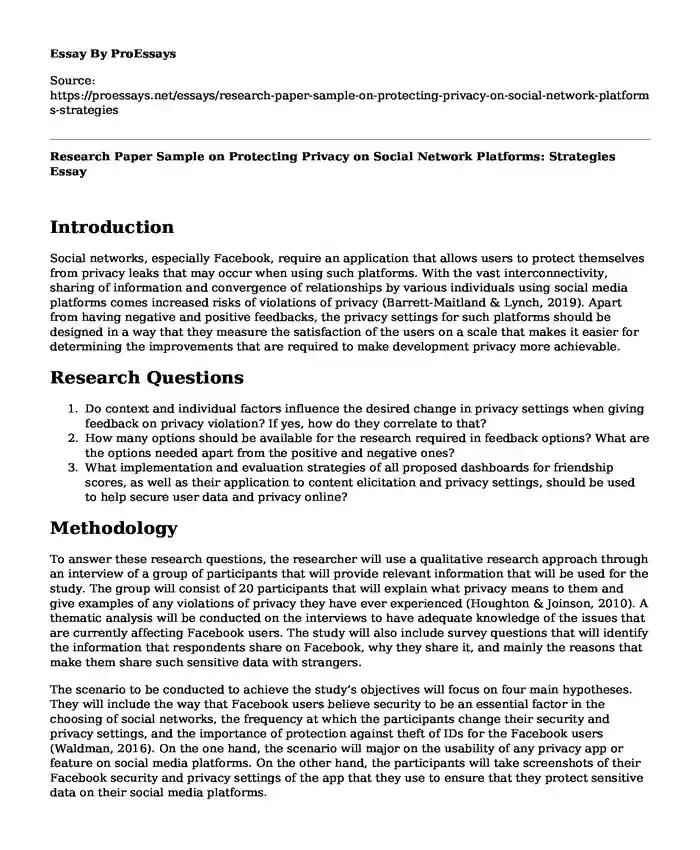Introduction
Social networks, especially Facebook, require an application that allows users to protect themselves from privacy leaks that may occur when using such platforms. With the vast interconnectivity, sharing of information and convergence of relationships by various individuals using social media platforms comes increased risks of violations of privacy (Barrett-Maitland & Lynch, 2019). Apart from having negative and positive feedbacks, the privacy settings for such platforms should be designed in a way that they measure the satisfaction of the users on a scale that makes it easier for determining the improvements that are required to make development privacy more achievable.
Research Questions
- Do context and individual factors influence the desired change in privacy settings when giving feedback on privacy violation? If yes, how do they correlate to that?
- How many options should be available for the research required in feedback options? What are the options needed apart from the positive and negative ones?
- What implementation and evaluation strategies of all proposed dashboards for friendship scores, as well as their application to content elicitation and privacy settings, should be used to help secure user data and privacy online?
Methodology
To answer these research questions, the researcher will use a qualitative research approach through an interview of a group of participants that will provide relevant information that will be used for the study. The group will consist of 20 participants that will explain what privacy means to them and give examples of any violations of privacy they have ever experienced (Houghton & Joinson, 2010). A thematic analysis will be conducted on the interviews to have adequate knowledge of the issues that are currently affecting Facebook users. The study will also include survey questions that will identify the information that respondents share on Facebook, why they share it, and mainly the reasons that make them share such sensitive data with strangers.
The scenario to be conducted to achieve the study’s objectives will focus on four main hypotheses. They will include the way that Facebook users believe security to be an essential factor in the choosing of social networks, the frequency at which the participants change their security and privacy settings, and the importance of protection against theft of IDs for the Facebook users (Waldman, 2016). On the one hand, the scenario will major on the usability of any privacy app or feature on social media platforms. On the other hand, the participants will take screenshots of their Facebook security and privacy settings of the app that they use to ensure that they protect sensitive data on their social media platforms.
Past Studies of Privacy
Wedges will also be conducted to help in measuring the effectiveness of the radar metaphors used to determine false positives. The participants will help in supporting the studies by showing how the application of In-situ Feedback on social network platforms helps protect users’ privacy (Hoffmann, 2012). The participants will define better options for feedback apart from the positive and negative feedback options. The requirements for the feedback option provided for each participant are that it should offer more buttons to choose from apart from to make the feedback more detailed and not only offering a chance for replying positive or negative answers.
Conclusion
The research will establish a conducive environment to protect the participants from any physical or psychological harm for them to participate without fear of the data they provide being used for other purposes apart from the research. The first ethical principle that the study will adopt is respect for participants, where the main concern will be to protect the respondents’ autonomy (Lee et al., 2016). The researcher will inform the participants of their rights so that they are free to voluntarily participate and withdraw from the research if they feel that their rights are being violated. The participants will also be assured of their confidentiality and anonymity that will play a significant role in protecting their privacy in the collection, analysis, and reporting of presented data.
References
Barrett-Maitland, N., & Lynch, J. (2019). Social media, ethics, and privacy paradox. https://www.intechopen.com/online-first/social-media-ethics-and-the-privacy-paradox.
Hoffmann, B. C. (2012). An exploratory study of a user's Facebook security and privacy settings. https://cornerstone.lib.mnsu.edu/cgi/viewcontent.cgi?article=1069&context=etds
Houghton, D. J., &Joinson, A. N. (2010). Privacy, social network sites, and social relations. Journal of Technology in Human Services, 28(1-2), 74-94.
https://www.tandfonline.com/doi/pdf/10.1080/15228831003770775
Lee, W. W., Zankl, W., & Chang, H. (2016). An ethical approach to data privacy protection. Isaca Journal. https://digital.fundacionceibal.edu.uy/jspui/bitstream/123456789/271/1/An-Ethical-Approach-to-Data-Privacy-Protection_joa_Eng_1216.pdf
Waldman, A. E. (2016). Privacy, sharing, and trust: the Facebook study. Case W. Res. L. Rev., 67, 193. https://scholarlycommons.law.case.edu/cgi/viewcontent.cgi?article=4679&context=caselrev
Cite this page
Research Paper Sample on Protecting Privacy on Social Network Platforms: Strategies. (2023, Oct 05). Retrieved from https://proessays.net/essays/research-paper-sample-on-protecting-privacy-on-social-network-platforms-strategies
If you are the original author of this essay and no longer wish to have it published on the ProEssays website, please click below to request its removal:
- Art Essay: Caravaggio's Last Two Paintings
- Paper Example on Online Stalking
- The Role of Innovation in Competitiveness and Economic Development
- Compare and Contrast Essay on Theme of Racism and Gender Roles in Indiana Jones and Temple of Doom
- History of Hip-Hop: Rubble Kings and Beyond - Essay Sample
- Article Analysis Essay on Understanding a Photograph
- Musee D'Orsay: Home of Ancient Art From 1848-1914 - Essay Sample







